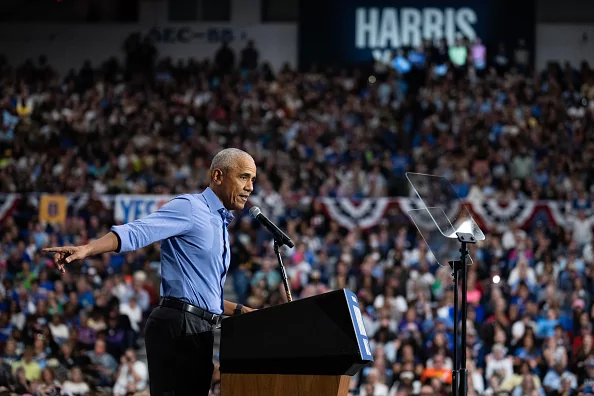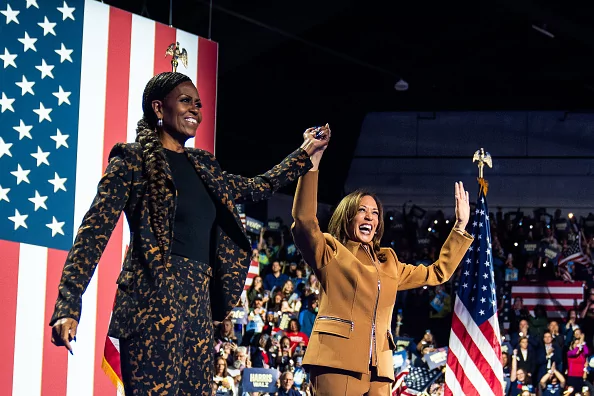PITTSBURGH — Two weeks ago, former President Barack Obama came here to rally support for Democratic presidential nominee Kamala Harris’s campaign as her numbers began to wane in Pennsylvania.
Before he took the stage, Obama chided black men at a Pittsburgh campaign field office because of internal polling numbers that showed the energy in the black community was not where it should be. At least not for Harris.
That lack of support for Harris, Obama said, “seems to be more pronounced with the brothers.”

He then scolded any black voter who was considering voting for former President Donald Trump or not showing up at all. He said one main reason they might not vote for her was their own sexism. He never once seemed to consider that maybe her values don’t match theirs, that her policies have negatively affected their lives, or that they think she is not up for the job.
After chiding black men, Obama spoke to an almost all-white audience of rallygoers in Allegheny County. His next stop was in Michigan, where he jumped on the Trump-is-Hitler bandwagon, then he went to Arizona and attacked Trump’s character, ridiculed him for listening to music, and for having the poor taste to have “Ave Maria” on his playlist.
“He’s standing there and he is swaying to ‘Ave Maria’ and ‘YMCA,’” Obama said, taking a swipe at the Franz Schubert tune based on the Roman Catholic prayer honoring the Mother of God. “Can you imagine if Tim [Walz] did that or Kamala did that? Now, our playlist would be better.”
Then, Obama had the audacity to ask when the country had become so divisive.
Days later, former first lady Michelle Obama dug her heels in even further in dividing the country by going after black men in a vicious plea for them to vote for Harris.
The former first lady warned them to “not hand our fates over to the likes of Trump, who knows nothing about us, who has shown a deep contempt for us.” She added, “So fellas, before you cast your vote, ask yourselves: What side of history do you want to be on?”

In the waning days of this election cycle, the decision by the Harris campaign team to bring Barack Obama in to propel her over the finish line might have been brilliant if they had brought out the 2004 version of Barack Obama. That was the version who brought the house down at the Democratic National Convention in Boston with a speech filled with a soaring oratory that propelled him four years later to run for president on a hyped-up version of “Hope and Change.”
That man was able to win over the voters of Pennsylvania in a historic landslide, keeping the New Deal Democrats part of a coalition he was crafting that also included minorities, young people, and college-educated women.
Four years later, Obama and his team understood that he could shed most of those New Deal Democrats and focus on the ascendant coalition of minorities, young people, and college-educated women and still win. Notably, he did so with an often haughty and dismissive air towards his own voters.
It certainly affected him in Pennsylvania. He left 286,000 voters uninspired to vote for him again in 2012. Republican nominee Mitt Romney didn’t inspire them either: He barely earned more than the late Sen. John McCain did in 2008 in the state.
So they just stayed home.
Two years later, unfazed by losing voters and breaking the Democratic coalition, Obama continued his lectures into his second midterm election cycle by mocking those who were skeptical of the excessive climate change hype. He had a good old time lobbing petty remarks in front of the League of Conservation voters in October 2014, saying, “It’s pretty rare that you encounter people who say that the problem of carbon pollution is not a problem,” Obama said. “In most communities and workplaces, they may not know how big a problem it is, they may not know exactly how it works, they may doubt they can do something about it.”
To which the elites in the crowd pumped up their arms in agreement at the very expense of the people in Pennsylvania, Ohio, Michigan, and Wisconsin who voted for him.
I remember watching that speech and thinking that it wasn’t going to play well back home. And it didn’t. The Democrats lost that second Obama midterm cycle two weeks later in historic numbers all the way down the ballot. Against them, Republicans picked up a majority in the Senate, an even larger majority in the House, gained two governorships that they were not expecting, and took majorities in the state legislatures all across the country in numbers that had not been achieved since the 1930s.
Michelle Obama has been no better. In the fall of 2017, a year after Trump had been elected president, she shamed female voters who backed him.
“Quite frankly, we saw this in this election,” Michelle Obama said at a sales conference in Boston. “As far as I’m concerned, any woman who voted against Hillary Clinton voted against their own voice. … Well, to me, that just says you don’t like your voice. You like the thing you’re told to like,” she said, presaging the current tactic of telling women they don’t have to tell their husbands who they are voting for or scolding them not to vote similarly to their husbands.
For the Democrats, the message in the closing arguments for Harris has been dark, filled with fearmongering, calling Trump Hitler and a fascist. It has television presenter Whoopi Goldberg telling viewers that Trump will break up interracial marriages and deport the spouses of white men, actress Julia Roberts telling women it’s OK to keep their ballot choices secret from their husbands as though their husbands would abuse them if they didn’t, and the Obamas looking down at many of the very people who voted for them.
Just as in 2014, I’m pretty sure this tactic doesn’t work back home.
CLICK HERE TO READ MORE FROM THE WASHINGTON EXAMINER
There was a reason that nearly 300,000 voters just stayed home in Pennsylvania in 2012 when Obama ran for reelection. Part of it was policy-driven. The government grew too big with Obamacare, regulations were killing their jobs and their communities, and internationalism had little interest to people who were still trying to recover from the Great Recession.
The other part was that the voters were tired of being told to stop being skeptical, wanting brakes on government spending, and overall being lectured to, not by “hope and change” but by Professor Obama, who knew so much better than they did about their lives.
